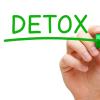CYBERMED LIFE - ORGANIC & NATURAL LIVING
CYBERMED LIFE - ORGANIC & NATURAL LIVING
 Detoxification or detoxication (detox for short) is the physiological or medicinal removal of toxic substances from a living organism, including the human body, which is mainly carried out by the liver. Additionally, it can refer to the period of withdrawal during which an organism returns to homeostasis after long-term use of an addictive substance. In medicine, detoxification can be achieved by decontamination of poison ingestion and the use of antidotes as well as techniques such as dialysis and (in a limited number of cases) chelation therapy.
Detoxification or detoxication (detox for short) is the physiological or medicinal removal of toxic substances from a living organism, including the human body, which is mainly carried out by the liver. Additionally, it can refer to the period of withdrawal during which an organism returns to homeostasis after long-term use of an addictive substance. In medicine, detoxification can be achieved by decontamination of poison ingestion and the use of antidotes as well as techniques such as dialysis and (in a limited number of cases) chelation therapy.
Many alternative medicine practitioners promote various types of detoxification such as detoxification diets. Scientists have described these as a "waste of time and money". Sense About Science, a UK-based charitable trust, determined that most such dietary "detox" claims lack any supporting evidence.